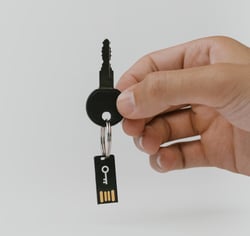Coronavirus Donation Scams: How to Tell Fact From Fiction

As COVID-19 continues to strain the physical, financial and emotional health of people around the world, it’s natural to want to look for ways to help.
For many of us, the best way to help others is by donating money to reputable charities and organizations.
Unfortunately, many cybercriminals have found ways to easily imitate these donation pages online, allowing them to keep your money and information for themselves.
This isn’t a new phenomenon. Online hackers are always looking for new ways to trick people into entering their data for personal gain, but now more than ever they’ve been able to profit off of the panic and devastation that surrounds the current pandemic.
As businesses increasingly rely on remote workers and the lines between personal and business devices blur, this threat puts businesses at risk along with individuals.
To help you spot these schemes, let’s discuss the telltale signs of a scam donation website and how to avoid accidentally giving away your information.
What Do Scams Look and Sound Like?
Cybercriminals are constantly working to successfully imitate reputable organizations with their own versions of websites, phone calls, emails and text messages. But even if their copies seem almost identical, there are still several ways to spot a scam.
The main clue that you may be dealing with a scammer is urgency. The quicker a scammer can get you to enter your personal information without thinking twice, the better. If the tone of the email, call, text or website is especially urgent, it’s probably not the real organization.
Also, legitimate organizations won’t require more information than necessary. For example, no one should be asking for you to enter your social security number to make a one-time donation or calling asking for your bank account or routing information.
On March 18th, the Federal Deposit Insurance Corporation published a notice with additional top tips to avoid becoming a victim, including advising to:
- Recognize if you are being pressured into making an instant commitment.
- Spend the time to research the charity you’re donating to, including checking if they are registered with your Secretary of State (if they are, you can check for a summary of their financial and tax records.)
- Use reputable resources like the Better Business Bureau’s Give.org to check their rating and status.
- Call the charity directly to ensure you’re donating on an authorized page.
By taking the time to do your research ahead of entering your personal information (and not giving into high-pressured demands) you can save yourself a whole lot of trouble and financial distress in the long run.
What Scams are Circulating Now?
Another proactive way to avoid being scammed is to stay up-to-date on the current schemes that are making their way through the internet and into your email inbox.
Here are some of the most popular formats that cybercriminals are using now to steal your information:
- Fake Crowdfunding Websites: Crowdfunding websites like GoFundMe can easily be imitated with stories about COVID-19 hardships that aren’t true. They can imitate real crowdfunding pages by using other people’s pictures, names or social media profiles to seem more legitimate. Be careful about what links you’re clicking on, and make sure that you trust the sources that are sharing these pages.
- Fake Charities: Cybercriminals are posing as authentic-looking charities that only exist to get you to enter your information and to get access to your bank accounts. Double-check the charity on the Better Business Bureau and stay vigilant by taking note if someone is asking for banking information or if there are excessive grammar and spelling errors in any website, email or text messages.
- Unsolicited Emails Asking for Alternative Donations: Reputable charities and organizations will not ask you for donations in alternative forms, such as wire transfers, gift cards or cash through the mail.
- Unsolicited Phone Calls Asking for Bank Information: Remember – no reputable organizations or government bodies will call you to ask for personal banking information or data, like your account numbers or social security numbers.
As you’re looking to donate to legitimate organizations, make sure you’re going to the source and donating via authorized pages, instead of through emails, text messages or phone calls that may not even be related to the charity you’re trying to support.
Remember These Online Safety Tips
When in doubt, remember to keep in mind these basic online safety practices as you peruse the web during the COVID-19 pandemic, including:
- Don’t click or download email attachments from unknown senders.
- Don’t enter unnecessary personal information online.
- Choose strong passwords for your accounts and keep them off your computer or safe in a password manager.
- Make sure your internet connection is secure and keep your antivirus programs up to date.
- Remember, government agencies don’t send unsolicited emails, according to the FBI.
- Stay current on COVID-19 from legitimate news sources and medical sites, like The Associated Press, Centers for Disease Control and Prevention and The World Health Organization.
If you have any questions on keeping your internet connection secure and protected, contact Switchfast today to learn more about how we help businesses stay safe










